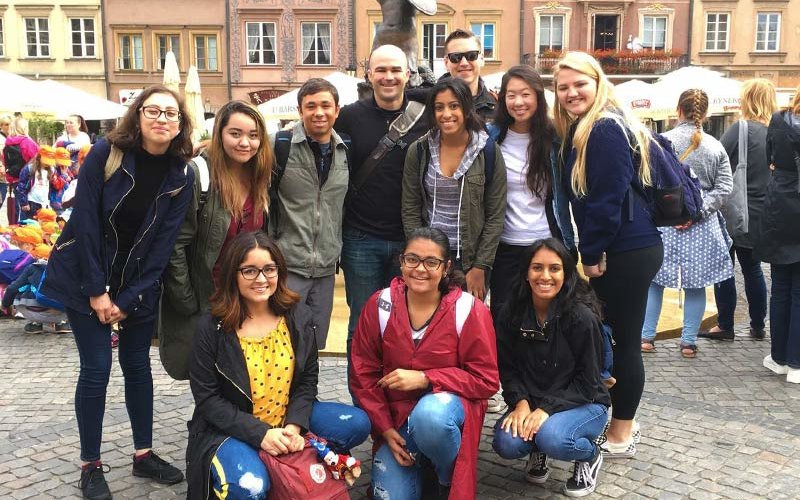
Hailey Siedentopp remembers a Polish historian talking about “walking through a graveyard every day.”
“She was not literally talking about a graveyard, but about her town of Warsaw, which suffered so much death and destruction during World War II,” explains the junior kinesiology major. Hearing it said that way “was very eye opening, very sobering.”
Siedentopp was one of 10 students in the first Cal State Fullerton study abroad program developed specifically for honors scholars.
Until now, the University Honors Program offered its students “discussion-based classes that have great depth precisely because our students are seriously invested in the learning experience,” says Sandra Perez, program director. “However, if we are truly committed to forming global citizens, then we need to offer those experiences for deep learning outside of the United States as well.
I wanted students to reflect upon what it is like to have to rebuild, not just buildings, but a culture, after something like the Holocaust.
“Study abroad can be that magical, short-term, transformative experience that can have long-lasting impact on students,” she explains. “We plan to continue our Summer Honors Learning Academy with a two-year rotation of locations and we’re making final decisions regarding the location for 2020 and 2021.”
Poland was a good place to offer a study abroad program, says John Gleaves, program leader and assistant director of the University Honors Program. “Its history throughout the 18th, 19th and 20th century provided the perfect inroads to explore ideas ranging from identity and nationalism to genocide, totalitarianism and globalization. It provided an ideal backdrop for the two courses: Political Philosophy and Peace, and War and Conflict.
“As the instructor, I really wanted students to see the world through Polish eyes,” he notes. “Americans tend to think of World War II in terms of the greatest generation and success, but in Poland, World War II was a period of intense devastation. So I wanted students to reflect upon what it is like to have to rebuild, not just buildings, but a culture, after something like the Holocaust.”
The experience included a visit to the Auschwitz concentration camp and tours of the communist neighborhoods of Nowa Huta and Plaszów, the Warsaw Rising Museum and the Immigration Museum in Gdynia.
Seeing the Berlin Wall and the tall watchtowers vividly brought to life the experiences of Siedentopp’s grandparents, who emigrated from Germany.
Her grandfather escaped by climbing the Wall and was running across the infamous ‘no man’s zone’ with a friend when a tower spotlight captured them. “My grandfather was sure that they would be killed or taken back,” Siedentopp says, “but someone shot out the light and they were able to get away.”
“I knew that seeing things like the Berlin Wall would spark conversations about the discussion in the United States about building a wall,” says Gleaves, “but the connections increased as students drew inspiration from Poland’s Solidarity movement and suppression of the press under communism. I think students really appreciated that, despite not having easy answers, now is a time for being engaged with what is happening to people around them.”
“I realized the capability we have to do things to others,” Siedentopp says. “It made me think about what is happening in the world today, about my choices and what I would fight for.”